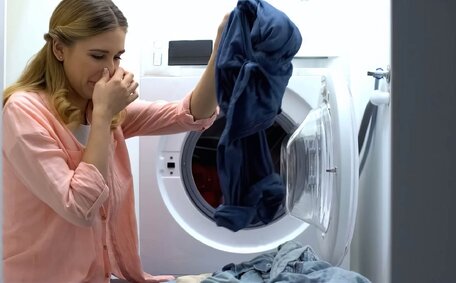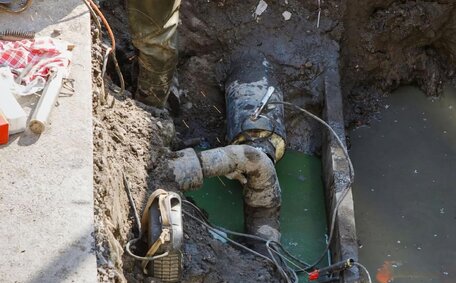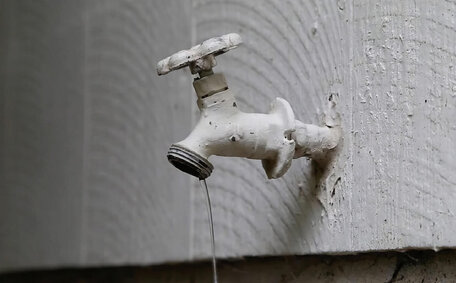What is pipe relining and why is it needed?
Pipe lining is a trenchless method of repairing damaged pipes without having to excavate them. It involves inserting a resin-saturated liner into the existing pipe which can also cure in place to essentially create a new pipe within the old one. Reasons your plumbing may need relining include:
- Cracks in a valve washer or leaks allowing water to seep into surrounding soil
- Corrosion weakening the integrity of pipes
- Root intrusion, often the root cause of blockages from nearby trees
- General wear and tear on plumbing fixtures over time
Pipe relining can strengthen pipes internally, renewing their fortitude and sealing leaks in a less disruptive manner without the need for digging up your yard. Using this method can economically be a wise choice to extend the life of your aging household water pipes, ensuring smooth operation and circumventing potential future issues.
Evaluating if your pipes could benefit from relining
There are several signs that your pipes may need relining, including:
- Visible corrosion or decay on pipe exteriors
- Frequent clogs, perhaps from baking soda and vinegar reactions, can cause blocked drains and issues with your sewer line
- Gurgling sounds indicating your drains can be encumbered by underlying issues
- Musty odours emanating from your drain or toilet, possibly indicating a clogged drain
- Pooling water around pipe joints, possibly indicating septic tank issues
- Cracks or damp spots on walls/ceilings, often indicative of concealed water leaks
- Elevated water bills
In many instances, houses over 20-30 years of age will likely show signs of wear in the extensive plumbing system, making it wise to consult a plumber your trust. Older water systems, which can get corroded over decades of use, tend to be made of materials like galvanised steel or cast iron, each representing a type of pipe suitable for certain applications.
If you notice any of the above issues, sewer line relining may be a smart solution. Sewer pipe lining is a nuanced plumbing repair procedure, involving an epoxy resin coat on the insides of your sewer pipes to seal damage and rejuvenate their structural stability. Relining can avoid the need to dig up and replace whole pipe sections.
What does pipe relining entail when handled by a plumber in such situations? A licensed plumber can assist as there could be concealed problems only a camera inspection of your plumbing works could reveal. They can then advise if relining is suitable or if full pipe replacement is necessary.
Attempting DIY pipe relining: Considerations
The lure of saving funds might tempt you to do diy plumbing pipe relining yourself, yet considerable risks are involved that homeowners must carefully evaluate.
Crucial considerations before a DIY relining effort can use your judgement are:
- Technical expertise - Pipe relining requires specialised materials and equipment to insert the liner and properly cure the resin, without which you might inadvertently damage pipes. Without proper training, errors can cause damage more significant than simple leaks that might damage your property or lead to further pipe complications.
- Health hazards - The chemicals involved in relining are potentially hazardous and not addressing proper procedure can lead to more serious plumbing issues. Proper protective gear is required.
- Permits + regulations - Most areas require certified plumbers to acquire permits before undertaking any serious plumbing work. Failing to get permits could cause more legal complications, including fines.
- Warranties - Professional plumbers usually offer guarantees on their plumbing projects, particularly with relining work. Any DIY approach you undertake might lack financial backing if you need to fix your own plumbing mistakes.
- Insurance - If mistakes lead to property damage from pipe repairs that result in leaks, your homeowners insurance may not cover unlicensed DIY work.
Although homeowners can do DIY repairs themselves, labour-intensive tasks such as sewer repairs necessitate the expertise of seasoned professionals. When you ponder, 'Is it time to call a plumber to mend these issues?', it’s crucial to consider that the savings hardly outweigh the potential risks. To ensure a thorough inspection and accurate assessment of your pipes, don’t hesitate to call a plumber to do what they’re trained for, offering expert advice on relining.
Equipment needs for DIY pipe relining
Employing a DIY method for pipe relining necessitates obtaining specialised equipment that isn’t found in a typical toolkit, leading many to call a professional plumber, which includes:
- Industrial pipe relining resin and catalyst
- Felt or fibreglass liner saturated with resin
- Tube winding machine to insert liner into the sewer pipe
- Temperature gauges and heaters to cure resin
- Pipe inspection camera to make sure the pre-work analysis is accurate
- Sanders, scrubbers, pressure washers for preparation, sometimes involving gas fitting aspects
- Chemical drain cleaners, respirators, protective equipment
The materials can pose a hazard which some homeowners may prefer to avoid, safeguarding their effort and money from literally going down the drain, and the process requires precision to follow essential plumbing tips if errors occur. The equipment also represents major upfront costs compared to hiring an experienced professional plumber who already owns industrial equipment for projects like irrigation system piping and blocked stormwater drains relining.
Attempting a DIY relining without the appropriate gear and know-how could cause damage that results in leaks, blockages, or further compromise to your pipes indicating it might be time to call a professional. To ensure plans are managed swiftly and efficiently, call a professional plumber for guidance before initiating any DIY pipelining project, as they can get the job done without the hassle.
Safety precautions for DIY pipe relining
Asking yourself, 'Should I call a plumber?' is important when attempting DIY pipe relining due to the stringent safety measures required from the chemicals and techniques involved. Key precautions include:
- Wearing a respirator mask and chemical-resistant gloves/clothing to avoid toxin exposure
- Working in a well-ventilated area to prevent fume buildup
- Having a fire extinguisher on hand given flammability concerns
- You should turn off water supply along with your hot water heater and gas lines as a crucial preventative measure against potential leaks
- ensure the precise ratios and curing times are followed for drain pipes to avoid any resin setting issues
- Using equipment properly to avoid burns or lacerations
- Carefully pressure testing liners before returning water flow
- Disposing of chemical waste correctly after project completion
Without adherence to safety protocols, DIYers risk chemical burns, lung damage from fumes, and property damage from leaks; in such situations, it’s time to let a professional plumber do what they’re trained for. It takes extensive training to manage these risks associated with complex plumbing jobs. Consultation with a professional plumber is highly advised before attempting pipe relining as a DIY project.
When to call a professional plumber instead
When DIY pipe relining might pose safety risks or jeopardise the longevity of your house’s plumbing, it’s time to beckon the experts. Situations signalling it’s time to call professional assistance include:
- Frozen pipes, tree roots or extensive pipe damage - Attempting to insert liners around roots or severely corroded sections risks further damage. Professionals can do the job with specialised tools and offer a resourceful way to fix underlying plumbing concerns, prioritising the removal of roots and repairing the sections that could damage your lines first.
- Asbestos or lead pipes found - Removal and disposal of hazardous materials requires safety protocols DIYers typically don’t have.
- Limited access to confined spaces - Pipe liners require insertion along the entire pipe length; limited accessibility rules out a DIY approach.
- Major leaks or busted pipes - Major pipe damage can lead to flooding, mould issues, soil erosion and foundation problems. When unearthing significant damage and immediate action is paramount, it’s the right time to call and let a plumber with the right tools get the job done with their expertise.
While competent DIYers may handle smaller pipe issues, relining extensive damage is complex work best left to a professional plumber. The Quakers Hill Plumbing team, recognised as the best plumber in the neighbourhood, has decades of specialist expertise in maintaining sewer lines and installing the highest quality pipe liners to Australian standards, even for a broken sewer line.
Boasting upfront inspections and extensive warranties on all work, you can count on our team to get the job done swiftly and securely. Contact us on 1300 349 338 or email to schedule an appointment if you suspect your pipes need relining.
Benefits of hiring a professional for relining
There are several key benefits to hiring a professional plumber for pipe relining services rather than attempting DIY pipelining:
- Expertise + equipment - With all the necessary relining materials, tube winding machines, and resin curing equipment at their disposal, professionals are set to get the job done right—that typical DIY enthusiasts do not have access to.
- Compliance + permits - One reason to call a professional plumber is that they comply with local regulations and secure necessary permits before any relining work, preventing potential complications from metaphorically going down the drain.
- Safety - Professionals follow strict protocols around chemical handling, protective gear, adequate ventilation and fire precautions - reducing the risk of plumbing problems and ensuring safety for both homeowners and workers.
- Warranties - Most professional plumbers provide multi-year warranties on pipe relining work, promising durability and longevity.
- Insurance - Any mistakes by professionals that cause any property damage will be covered by plumbersâ€TM existing liability insurance policies for any sewer repair needed.
Hiring professionals, while appearing costly upfront, often saves money long-term compared to DIY pipelining through superior materials, quality workmanship and warranties on services. Investing in professional expertise delivers peace of mind to homeowners, ensuring that the relining work is compliant, safe, and built to last.
For specialist pipe relining services in the Quakers Hill area, contact the Quakers Hill Plumbing team or call 1300 349 338. Our licenced plumbers have the experience, equipment, and safety knowledge to manage any plumbing drainage task, ensuring the job is done right.
An overview of the pipe relining process
The professional pipe relining process involves multiple key steps:
- Inspection - A camera inspection can help in surveying pipe interiors to identify issues such as clogged drains, a critical step for effectual sewer line repair. Plumbers can identify the right measurements to custom-fit the liner, ensuring much more accuracy for a proper fit.
- Cleaning - Expert drain cleaners, equipped with specialised tools like a drain snake, perform cleaning to unclog your blocked drains by scrubbing and pressure washing so that liners can adhere properly.
- Liner preparation - Felt or fibreglass liners are cut to size and saturated with epoxy resin per measurements.
- Installation - Using a winding machine, the liner is inserted through a drain opening such as a manhole.
- Curing - Hot water or steam is pumped inside to cure the epoxy resin, bonding it to the old pipe walls.
- Cool down + finish - Once cured, the pipes are cooled and ends trimmed for a clean finish.
- Inspection + testing - Final camera inspections check for smooth installations before pressure testing to confirm integrity.
Every step requires expertise - from custom resin mixing to operating winding machines for your new hot water system pipes. Attempting pipe relining without proper training risks resin curing errors, leaks, blockages or failure to adhere liners correctly.
Our Quakers Hill Plumbing crew has specialist equipment and years of pipelining experience needed to deliver quality, long-lasting results. Contact us or call 1300 349 338 to get your pipes assessed for potential deterioration.
Pipe materials suitable for relining
There are several pipe materials that can typically be relined effectively:
- PVC (Polyvinyl Chloride) - One of the most common modern types for your pipe infrastructure. Flexible plastic liners can readily adhere to existing PVC pipe walls.
- Copper - Copper pipes, known for longevity and strength, can handle your household’s needs quite well when it comes to pipelining. Epoxy resins used in relining are often stronger than the original pipe material, bonding well with most copper types.
- Cast Iron - While corrosion is a problem for old iron pipes, relining provides an alternative with a lower cost to pipe replacement. Just ensure any severe rust is addressed first.
Materials generally not recommended for pipelining include terracotta pipes which are too brittle and porous for liners to effectively extend the life of your pipes. Extensively damaged steel pipes are also better off fully replaced over relined if budget permits.
An experienced plumber will know what pipe materials in your home are optimal for professional relining work and if any custom solutions are necessary. Our Quakers Hill Plumbing team has extensive experience in fixing plumbing systems and has relined thousands of pipes made of PVC, copper, cast iron and more.
For reliable pipe relining services in the Sydney area, contact us or call 1300 349 338. Our licenced, expert plumbers can reline your pipes for a fraction of full replacement cost.
Cost comparison: DIY vs. professional relining
Homeowners frequently question how much pipe relining costs and what expenses to anticipate, which includes considering the significant upfront costs for Individuals who can DIY, purchasing or renting specialised equipment. This includes pipe cameras, winding machines, epoxy resins and curing systems which could cost thousands of dollars. Rental fees accumulate daily until Do-it-yourself projects are finished.
In contrast, a professional plumbing service will conduct more than just pipe inspections; they will acquire all necessary materials, furnish equipment, and guarantee the pipelining job is carried out capably, whether it’s a repair or a complete installation. Their expertise also ensures correct techniques, limiting risks of complications in your plumbing project, which you could end up with by making DIY pipe relining more costly if post-repair work becomes necessary.
When hiring professional pipe relining services, though the initial cost may be higher than basic DIY methods, you’re investing in peace of mind because of their considerable experience, professional-grade equipment and expertise in safety protocols. This often encourages homeowners to hire professional services, offering peace of mind with higher quality, longer lasting results.
Factoring in the costs of avoided risks and damages by hiring experts instead of tackling pipe relining solo, the price of professional services is often comparable or cheaper long-term. Plus licenced plumbers offer warranties and insurance to guarantee their workmanship.






